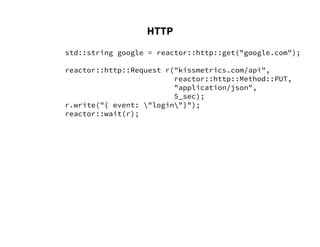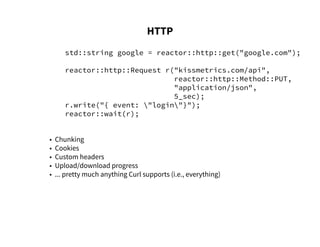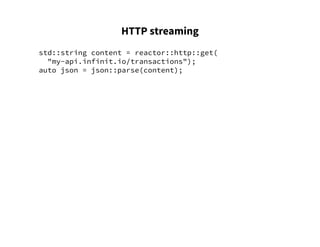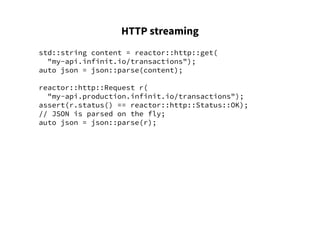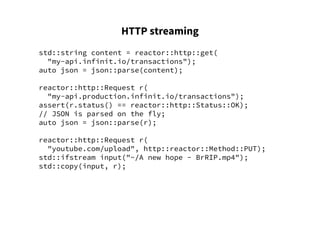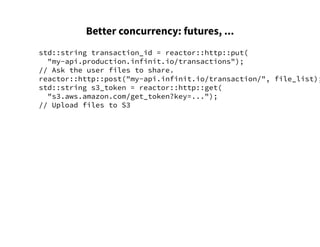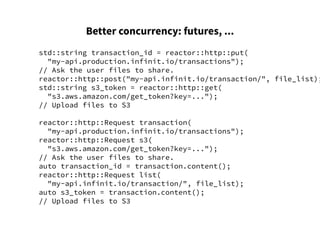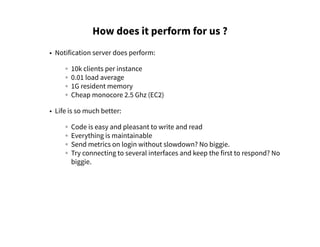The document discusses the differences between concurrent and parallel programming, emphasizing their respective purposes in managing tasks and system resources. It provides practical examples of programming scenarios, such as video encoding and server design, to illustrate the concepts of concurrency and parallelism, as well as the challenges and complexities associated with each approach. The text concludes with a focus on coroutines as a solution for achieving concurrency without the complications of traditional threading.
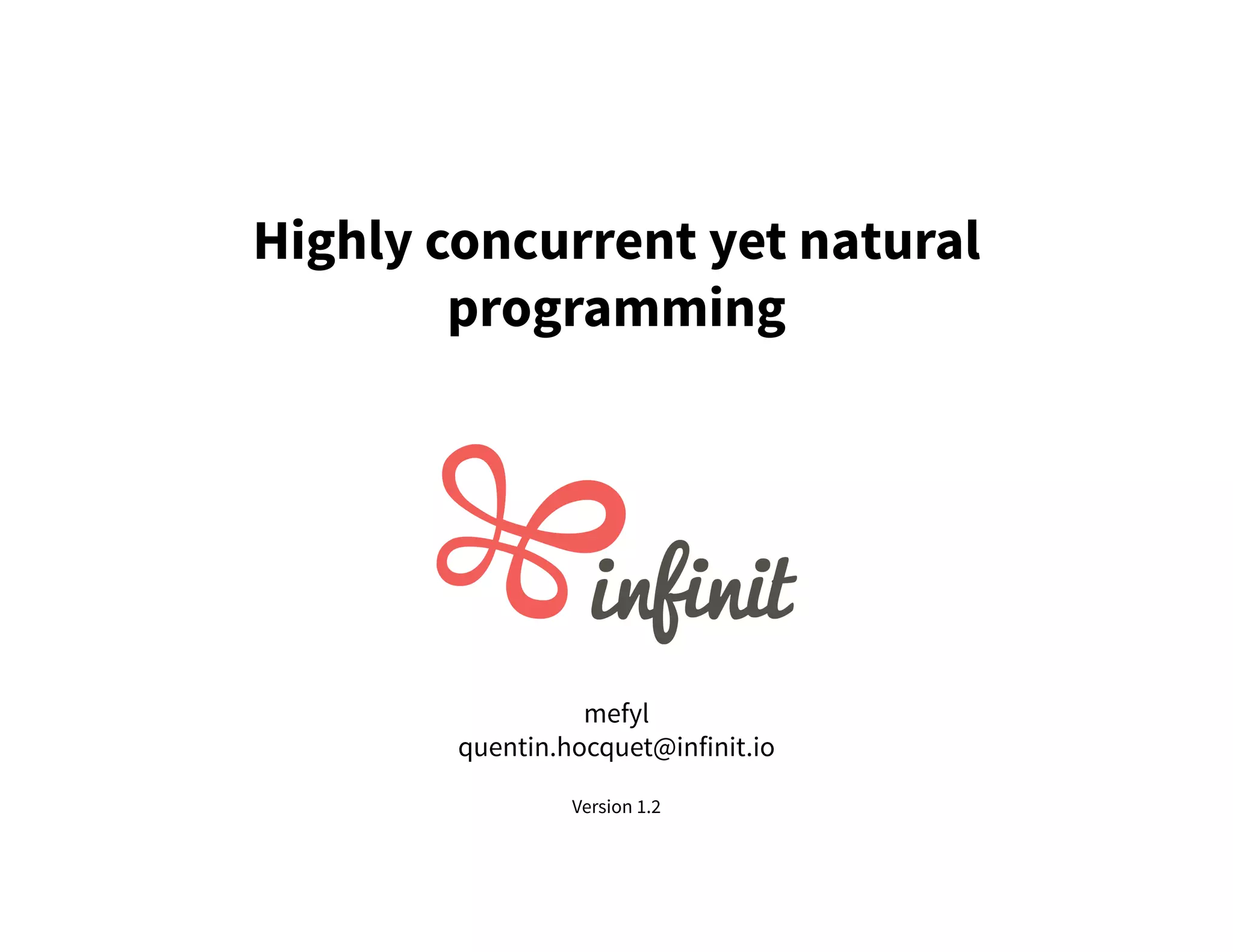

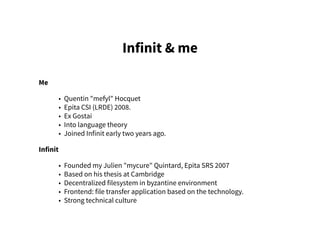
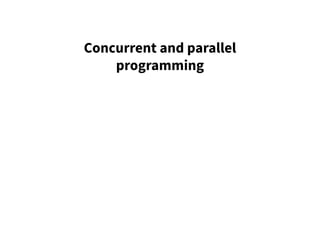
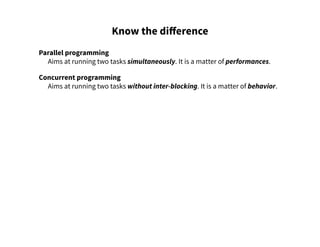
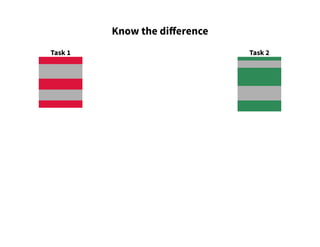
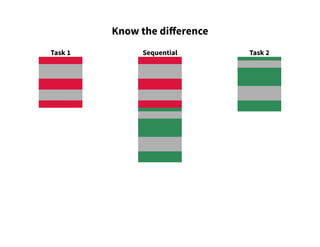
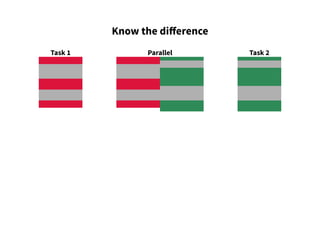
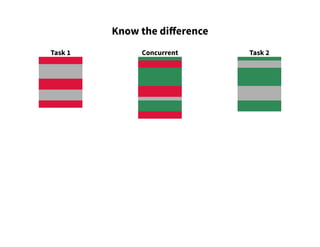
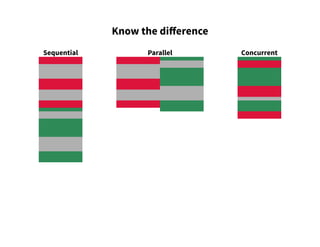
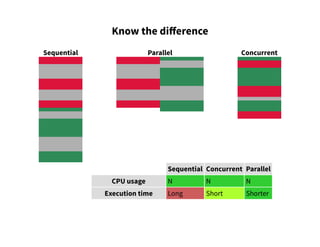
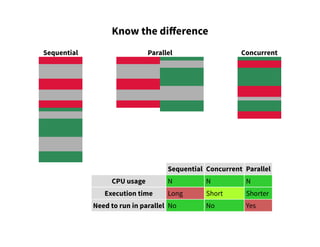
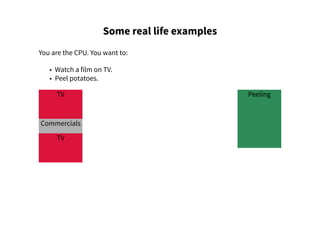
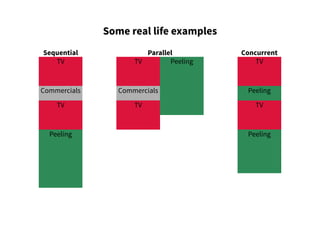
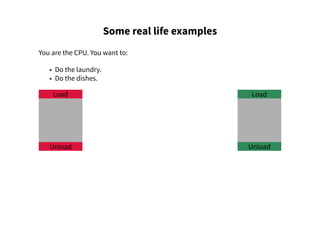

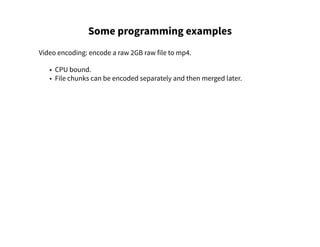
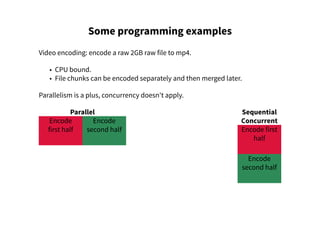
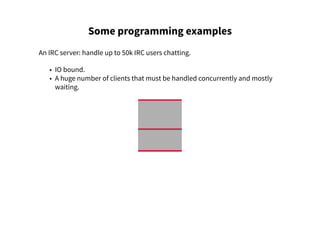
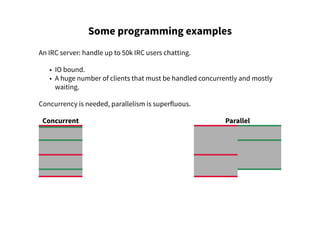
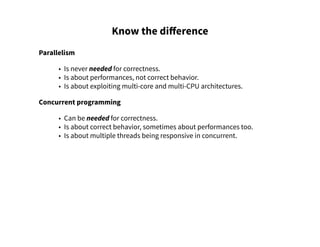
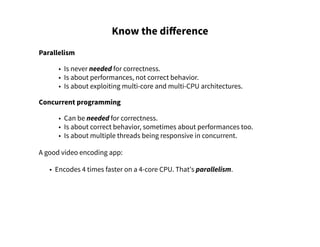
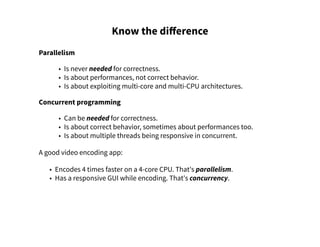




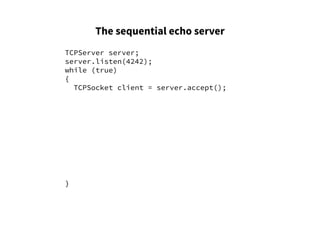
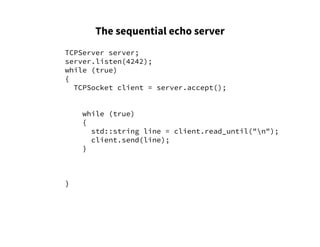
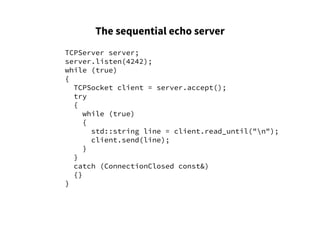
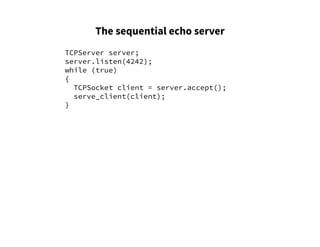
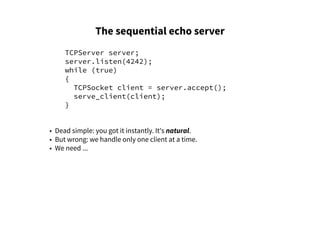
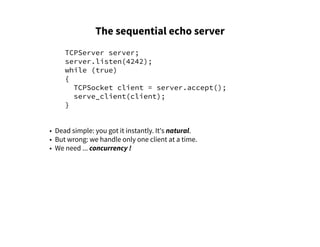
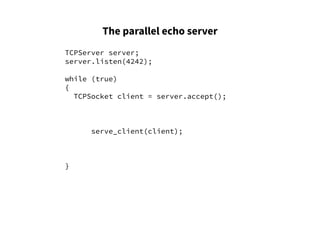
![The parallel echo server
TCPServer server;
server.listen(4242);
std::vector<std::thread> threads;
while (true)
{
TCPSocket client = server.accept();
std::thread client_thread(
[&]
{
serve_client(client);
});
client_thread.run();
vectors.push_back(std::move(client_thread));
}](https://image.slidesharecdn.com/highly-concurrent-yet-natural-programming-141111025519-conversion-gate02-151114230925-lva1-app6891/85/Highly-concurrent-yet-natural-programming-35-320.jpg)
![The parallel echo server
TCPServer server;
server.listen(4242);
std::vector<std::thread> threads;
while (true)
{
TCPSocket client = server.accept();
std::thread client_thread(
[&]
{
serve_client(client);
});
client_thread.run();
vectors.push_back(std::move(client_thread));
}
• Almost as simple and still natural,
• To add the concurrency property, we just added a concurrency construct
to the existing.](https://image.slidesharecdn.com/highly-concurrent-yet-natural-programming-141111025519-conversion-gate02-151114230925-lva1-app6891/85/Highly-concurrent-yet-natural-programming-36-320.jpg)


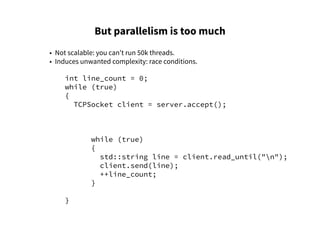
![But parallelism is too much
• Not scalable: you can't run 50k threads.
• Induces unwanted complexity: race conditions.
int line_count = 0;
while (true)
{
TCPSocket client = server.accept();
std::thread client_thread(
[&]
{
while (true)
{
std::string line = client.read_until("n");
client.send(line);
++line_count;
}
});
}](https://image.slidesharecdn.com/highly-concurrent-yet-natural-programming-141111025519-conversion-gate02-151114230925-lva1-app6891/85/Highly-concurrent-yet-natural-programming-40-320.jpg)


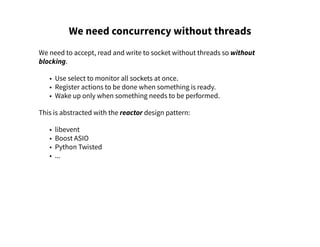
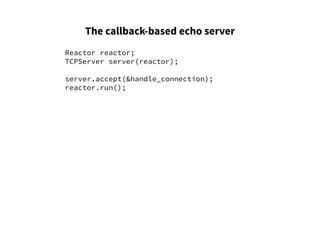
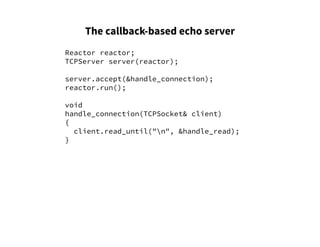
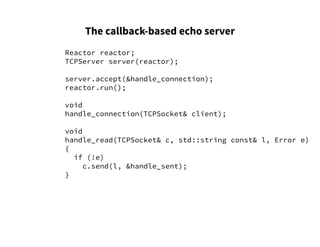
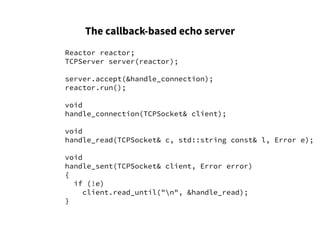



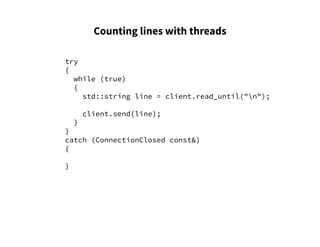
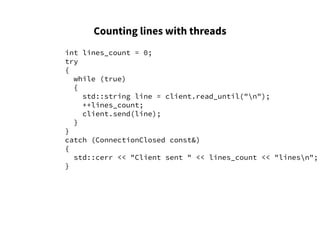
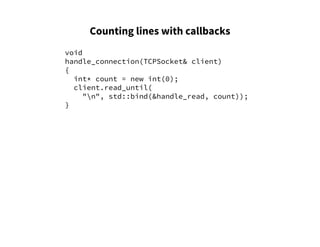
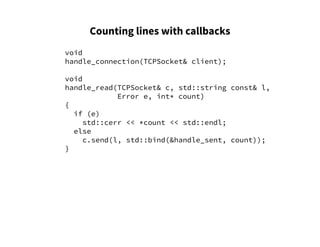
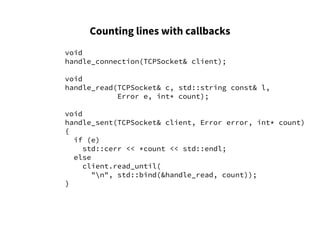
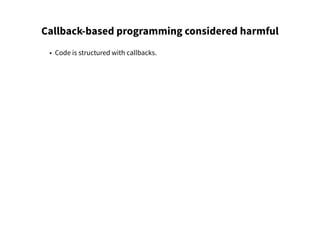
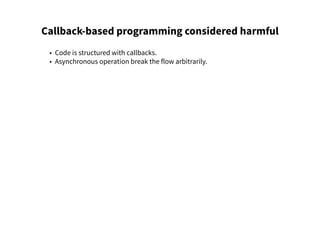
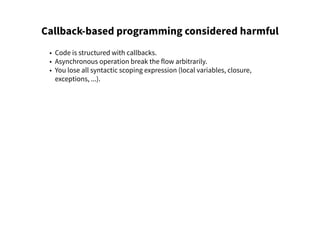
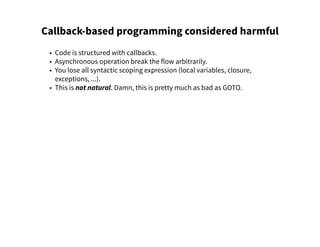


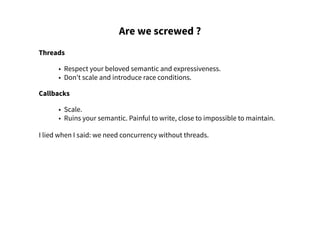
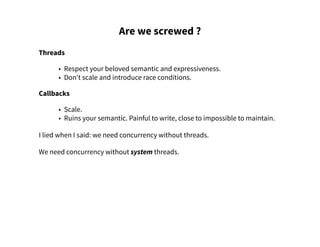


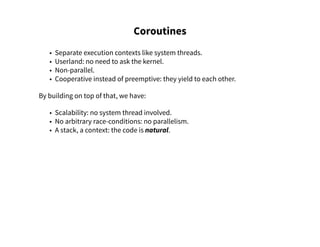


![Coroutines-based echo server
TCPServer server; server.listen(4242);
std::vector<Thread> threads;
int lines_count = 0;
while (true)
{
TCPSocket client = server.accept();
Thread t([client = std::move(client)] {
try
{
while (true)
{
++lines_count;
client.send(client.read_until("n"));
}
}
catch (ConnectionClosed const&) {}
});
threads.push_back(std::move(t));
}](https://image.slidesharecdn.com/highly-concurrent-yet-natural-programming-141111025519-conversion-gate02-151114230925-lva1-app6891/85/Highly-concurrent-yet-natural-programming-69-320.jpg)

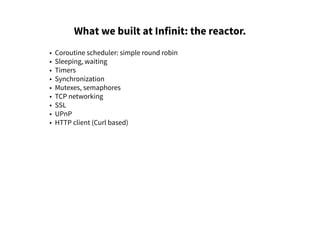
![Coroutine scheduling
reactor::Scheduler sched;
reactor::Thread t1(sched,
[&]
{
print("Hello 1");
reactor::yield();
print("Bye 1");
});
reactor::Thread t2(sched,
[&]
{
print("Hello 2");
reactor::yield();
print("Bye 2");
});
);
sched.run();](https://image.slidesharecdn.com/highly-concurrent-yet-natural-programming-141111025519-conversion-gate02-151114230925-lva1-app6891/85/Highly-concurrent-yet-natural-programming-72-320.jpg)
![Coroutine scheduling
reactor::Scheduler sched;
reactor::Thread t1(sched,
[&]
{
print("Hello 1");
reactor::yield();
print("Bye 1");
});
reactor::Thread t2(sched,
[&]
{
print("Hello 2");
reactor::yield();
print("Bye 2");
});
);
sched.run();
Hello 1
Hello 2
Bye 1
Bye 2](https://image.slidesharecdn.com/highly-concurrent-yet-natural-programming-141111025519-conversion-gate02-151114230925-lva1-app6891/85/Highly-concurrent-yet-natural-programming-73-320.jpg)
![Sleeping and waiting
reactor::Thread t1(sched,
[&]
{
print("Hello 1");
reactor::sleep(500_ms);
print("Bye 1");
});
reactor::Thread t2(sched,
[&]
{
print("Hello 2");
reactor::yield();
print("World 2");
reactor::yield();
print("Bye 2");
});
);](https://image.slidesharecdn.com/highly-concurrent-yet-natural-programming-141111025519-conversion-gate02-151114230925-lva1-app6891/85/Highly-concurrent-yet-natural-programming-74-320.jpg)
![Sleeping and waiting
reactor::Thread t1(sched,
[&]
{
print("Hello 1");
reactor::sleep(500_ms);
print("Bye 1");
});
reactor::Thread t2(sched,
[&]
{
print("Hello 2");
reactor::yield();
print("World 2");
reactor::yield();
print("Bye 2");
});
);
Hello 1
Hello 2
World 2
Bye 2](https://image.slidesharecdn.com/highly-concurrent-yet-natural-programming-141111025519-conversion-gate02-151114230925-lva1-app6891/85/Highly-concurrent-yet-natural-programming-75-320.jpg)
![Sleeping and waiting
reactor::Thread t1(sched,
[&]
{
print("Hello 1");
reactor::sleep(500_ms);
print("Bye 1");
});
reactor::Thread t2(sched,
[&]
{
print("Hello 2");
reactor::yield();
print("World 2");
reactor::yield();
print("Bye 2");
});
);
Hello 1
Hello 2
World 2
Bye 2
Bye 1](https://image.slidesharecdn.com/highly-concurrent-yet-natural-programming-141111025519-conversion-gate02-151114230925-lva1-app6891/85/Highly-concurrent-yet-natural-programming-76-320.jpg)
![Sleeping and waiting
reactor::Thread t1(sched,
[&]
{
print("Hello 1");
reactor::sleep(500_ms);
print("Bye 1");
});
reactor::Thread t2(sched,
[&]
{
print("Hello 2");
reactor::yield();
print("World 2");
reactor::wait(t1); // Wait
print("Bye 2");
});
);](https://image.slidesharecdn.com/highly-concurrent-yet-natural-programming-141111025519-conversion-gate02-151114230925-lva1-app6891/85/Highly-concurrent-yet-natural-programming-77-320.jpg)
![Sleeping and waiting
reactor::Thread t1(sched,
[&]
{
print("Hello 1");
reactor::sleep(500_ms);
print("Bye 1");
});
reactor::Thread t2(sched,
[&]
{
print("Hello 2");
reactor::yield();
print("World 2");
reactor::wait(t1); // Wait
print("Bye 2");
});
);
Hello 1
Hello 2
World 2](https://image.slidesharecdn.com/highly-concurrent-yet-natural-programming-141111025519-conversion-gate02-151114230925-lva1-app6891/85/Highly-concurrent-yet-natural-programming-78-320.jpg)
![Sleeping and waiting
reactor::Thread t1(sched,
[&]
{
print("Hello 1");
reactor::sleep(500_ms);
print("Bye 1");
});
reactor::Thread t2(sched,
[&]
{
print("Hello 2");
reactor::yield();
print("World 2");
reactor::wait(t1); // Wait
print("Bye 2");
});
);
Hello 1
Hello 2
World 2
Bye 1
Bye 2](https://image.slidesharecdn.com/highly-concurrent-yet-natural-programming-141111025519-conversion-gate02-151114230925-lva1-app6891/85/Highly-concurrent-yet-natural-programming-79-320.jpg)
![Synchronization: signals
reactor::Signal task_available;
std::vector<Task> tasks;
reactor::Thread handler([&] {
while (true)
{
if (!tasks.empty())
{
std::vector mytasks = std::move(tasks);
for (auto& task: tasks)
; // Handle task
}
else
reactor::wait(task_available);
}
});](https://image.slidesharecdn.com/highly-concurrent-yet-natural-programming-141111025519-conversion-gate02-151114230925-lva1-app6891/85/Highly-concurrent-yet-natural-programming-80-320.jpg)
![Synchronization: signals
reactor::Signal task_available;
std::vector<Task> tasks;
reactor::Thread handler([&] {
while (true)
{
if (!tasks.empty())
{
std::vector mytasks = std::move(tasks);
for (auto& task: tasks)
; // Handle task
}
else
reactor::wait(task_available);
}
});
tasks.push_back(...);
task_available.signal();](https://image.slidesharecdn.com/highly-concurrent-yet-natural-programming-141111025519-conversion-gate02-151114230925-lva1-app6891/85/Highly-concurrent-yet-natural-programming-81-320.jpg)
![Synchronization: signals
reactor::Signal task_available;
std::vector<Task> tasks;
reactor::Thread handler([&] {
while (true)
{
if (!tasks.empty()) // 1
{
std::vector mytasks = std::move(tasks);
for (auto& task: tasks)
; // Handle task
}
else
reactor::wait(task_available); // 4
}
});
tasks.push_back(...); // 2
task_available.signal(); // 3](https://image.slidesharecdn.com/highly-concurrent-yet-natural-programming-141111025519-conversion-gate02-151114230925-lva1-app6891/85/Highly-concurrent-yet-natural-programming-82-320.jpg)
![Synchronization: channels
reactor::Channel<Task> tasks;
reactor::Thread handler([&] {
while (true)
{
Task t = tasks.get();
// Handle task
}
});
tasks.put(...);](https://image.slidesharecdn.com/highly-concurrent-yet-natural-programming-141111025519-conversion-gate02-151114230925-lva1-app6891/85/Highly-concurrent-yet-natural-programming-83-320.jpg)

![Mutexes
But you said no race conditions! You lied again!
reactor::Thread t([&] {
while (true)
{
for (auto& socket: sockets)
socket.send("YO");
}
});
{
socket.push_back(...);
}](https://image.slidesharecdn.com/highly-concurrent-yet-natural-programming-141111025519-conversion-gate02-151114230925-lva1-app6891/85/Highly-concurrent-yet-natural-programming-85-320.jpg)
![Mutexes
But you said no race conditions! You lied again!
reactor::Mutex mutex;
reactor::Thread t([&] {
while (true)
{
reactor::wait(mutex);
for (auto& socket: sockets)
socket.send("YO");
mutex.unlock();
}
});
{
reactor::wait(mutex);
socket.push_back(...);
mutex.unlock();
}](https://image.slidesharecdn.com/highly-concurrent-yet-natural-programming-141111025519-conversion-gate02-151114230925-lva1-app6891/85/Highly-concurrent-yet-natural-programming-86-320.jpg)
![Mutexes
But you said no race conditions! You lied again!
reactor::Mutex mutex;
reactor::Thread t([&] {
while (true)
{
reactor::Lock lock(mutex);
for (auto& socket: sockets)
socket.send("YO");
}
});
{
reactor::Lock lock(mutex);
socket.push_back(...);
}](https://image.slidesharecdn.com/highly-concurrent-yet-natural-programming-141111025519-conversion-gate02-151114230925-lva1-app6891/85/Highly-concurrent-yet-natural-programming-87-320.jpg)
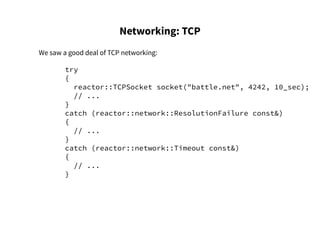
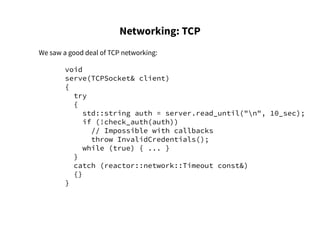
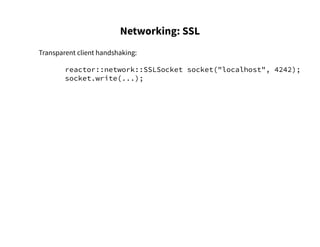
![Networking: SSL
Transparent server handshaking:
reactor::network::SSLServer server(certificate, key);
server.listen(4242);
while (true)
{
auto socket = server.accept();
reactor::Thread([&] { ... });
}](https://image.slidesharecdn.com/highly-concurrent-yet-natural-programming-141111025519-conversion-gate02-151114230925-lva1-app6891/85/Highly-concurrent-yet-natural-programming-91-320.jpg)
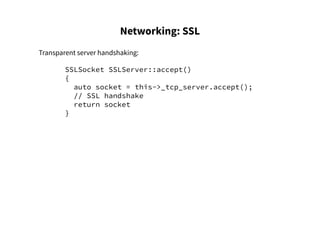
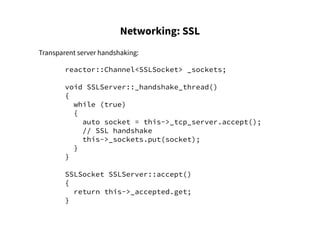
![Networking: SSL
Transparent server handshaking:
void SSLServer::_handshake_thread()
{
while (true)
{
auto socket = this->_tcp_server.accept();
reactor::Thread t(
[&]
{
// SSL handshake
this->_sockets.put(socket);
});
}
}](https://image.slidesharecdn.com/highly-concurrent-yet-natural-programming-141111025519-conversion-gate02-151114230925-lva1-app6891/85/Highly-concurrent-yet-natural-programming-94-320.jpg)

